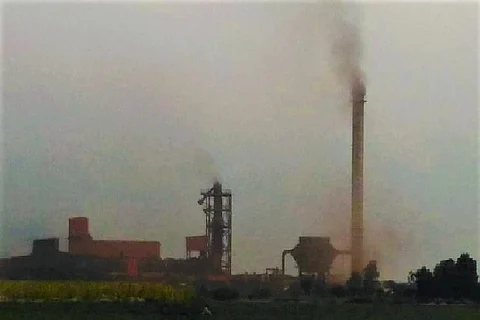

When 35-year-old Mounesh started farming Bengal gram on his 17-acre land in October 2017, despite minimum rain in the region, his crop initially was doing well. But Mounesh, who hails from the Kuraba community from Gonahal in Karnataka and had invested an average of Rs 10,000 per acre, found that his optimism was short-lived. Villagers allege the smoke is emanating from the sponge iron factory Neerajaksha Iron and Steel Pvt Ltd, located in Survey No 3, 4 and 5 in Madehalu Village of Kurnool district’s Halaharvi Mandal has affected hundreds of acres of farmland throughout the area.
Mounesh and other farmers allege that black smoke from the factory has covered surrounding fields and led to losses in crop yield. Though news of the factory being set up brought hopes of employment and livelihood opportunities, according to villagers, its presence has done more harm than good.
What is sponge iron?
Sponge iron, or Direct Reduced Iron (DRI), is a process of extracting iron from its raw ore. The process involves using gas, coal or dynamite to separate elements and remove impurities, which is carried out in kilns. At the end of the process, small pellets of 90 to 97 percent iron are extracted. The end p]roduct is sent to steel plants for the production of steel.

Conditions for operations
In 2008, the factory was granted Environmental Conditions (EC) for 200 TPD (tonnes per day) of production, on a land of 100 acres at a cost of Rs 61.6 crore, against a list of specific and general conditions. The conditions included proving bag filters, electrostatic precipitators, online stack monitoring, maintaining 33% green cover, environmental management cell, occupational health surveillance of the workers, that hazardous waste be managed according to Hazardous Waste Rules, 2003, and that solid waste be handled according to Solid Waste Management Rules, 2016.
The Consent of Establishment (COE), which was issued in 2009, states that there should be an interlocking system to control and prevent air pollution. The interlocking system automatically stops the raw material feeder in case the pollution control equipment fails.
However, after farmers incurred losses, they approached the Pollution Control Board claiming that the factory has not followed any norms. Air emissions from sponge iron plants could include heavy metals released as particles into air during the handling of the iron ore.

Farmer losses
Farmers share that they have observed a drastic drop in the yield in the past decade. On the average 600 acres of farmland tilled in the area, 350 acres of land have yielded crop losses, farmers allege.
A young farmer, 32-year-old Nagaraju, who is from the Kamma community, is a tenant farmer in Halaharvi in Kurnool district. As a tenant, he cultivated 12 acres of the farmland with Bengal grams. Nagaraju alleges that due to the pollution in the area, he has faced significant losses of his crop with the yield decreasing from an expected 6-7 quintals per acre to 3-4 quintals per acre.
40-year-old Eerramma, who lives in Gonalhall village, has also lost all her crop she had sown on her 9-acre farm, she alleges, after dust from the industry settled onto her crops when they were in the flowering stage. She claims she has incurred a loss of Rs 14,000 per acre.
In 2017, the villagers had staged protests in front of the plant after 80% of their crops had been allegedly destroyed by the pollution. In March 2018, the Mandal Agriculture Officer (MAO) of Halaharvi sent a notice to the factory, stating that the smoke and dust emanating from the industry was causing crop losses and asked the company to pay compensation to the farmers. However, the order did not detail the amount of compensation or the form in which it was paid.

The protests
On June 25 this year, the villagers lodged a complaint with Central Pollution Control Board, which was forwarded to the Andhra Pradesh PCB. The APPCB sent an inspection team which found there are no concrete roads, no interlocking system, no bag filters, no ESP, no sampling port, no permanent water sprinklers at the ore crusher, no activation recorder with the recording facility to ABC, no online stack monitoring system, and the list goes on. The APPCB had ordered the installation of all protection necessary by September 8, 2018.
However, when the writer visited the site, it was observed that there is no green cover, there were no filters, the ore was kept in the open as opposed to inside a closed shed, workers who were brought from Odisha had no protection from the pollution and lived in bad conditions, and that solid waste was dumped in the open.
When the head of APPCB, the Kurnool Zonal officer, was asked about the factory, said, “We will investigate. We have already warned the company.”
Despite repeated attempts, the company did not respond to a request for comment.